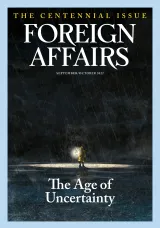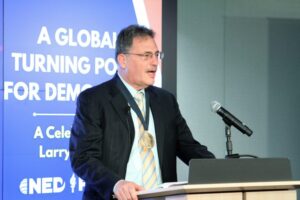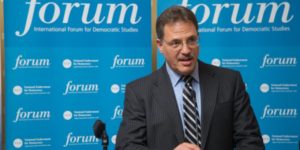 Most people around the world want political freedom, and they worry about its absence or fragility. Now more than ever, the world needs the United States to support democracy—and the United States needs a more muscular and imaginative approach to spreading it, according to Stanford University’s Larry Diamond.
Most people around the world want political freedom, and they worry about its absence or fragility. Now more than ever, the world needs the United States to support democracy—and the United States needs a more muscular and imaginative approach to spreading it, according to Stanford University’s Larry Diamond.
American foreign policy is not always pro-democratic, however. Policymakers are continually considering what constitutes the United States’ international interests, and in some cases they prioritize good relations with autocratic actors. That said, strong U.S. leadership is necessary—though not sufficient—for the health of global democracy, he writes for Foreign Affairs:
Finally, it is not safe to assume that all Americans appreciate the importance of promoting democracy abroad. The case for doing so must be made to each new generation. Whatever happens to the economic aspects of globalization, the world will continue to shrink: people, information, ideas, innovations, and diverse forms of influence cross borders constantly. What was true during the twentieth century is even truer today: every political system is affected by every other, and powerful, aggressive autocracies pose an existential and expansive threat to the world’s democracies.
 Policymakers cannot afford to sit back and hope that the autocrats will fail, says The Washington Post’s Josh Rogin. Western governments must devise a coherent response. The first step is to acknowledge the expanding authoritarian alliance and the threat it poses to our interests.
Policymakers cannot afford to sit back and hope that the autocrats will fail, says The Washington Post’s Josh Rogin. Western governments must devise a coherent response. The first step is to acknowledge the expanding authoritarian alliance and the threat it poses to our interests.
Biden administration’s Summit for Democracy draws on the tradition of liberal internationalism which revolves around the idea that global stability comes from democratic systems, free markets and participation in American-led multinational organizations, The New York Times reports.
“I think the rhetorical — and I would say sincerely moral — emphasis is welcome, as is the effort to draw democracies together,” Diamond told The Times.
But Mr. Diamond said there is a shortfall in the material resources the administration has devoted to bolstering democracy abroad. For one thing, he said, the United States must ensure it and its democratic partners are perceived as militarily stronger than their autocratic rivals. That means not only repelling the Russian invasion of Ukraine, he said, but also accelerating weapons deliveries to Taiwan so the island can deter a potential invasion by China.
He added that the Biden administration also needed to increase its public diplomacy efforts to turn international opinion against Russia and China, pointing to the difficulties that U.S. officials have had in getting member states of the United Nations to approve resolutions condemning Russia for the war in Ukraine.
 “Russia and China, with their vast propaganda apparatuses, have made very significant inroads, particularly in terms of elite opinion and dialogue,” Mr. Diamond said.
“Russia and China, with their vast propaganda apparatuses, have made very significant inroads, particularly in terms of elite opinion and dialogue,” Mr. Diamond said.
Most governments that are not democratic believe their legitimacy depends on claiming that they are. The gap between their claims and reality renders them vulnerable, adds Diamond, a founding co-editor of the National Endowment for Democracy’s Journal of Democracy:
Even if they are dissatisfied with democratic politicians and institutions, most people would still rather live in a democracy that offers protection for their rights. They want a democracy that is real and that works. The autocracies of the world—China, Egypt, Iran, and Russia, not to mention Venezuela and Zimbabwe and their unfolding calamities—face severe challenges precisely because of their lack of accountability and open debate.
All this suggests that the Zeitgeist can shift back in favor of democracy. But it won’t do so on its own. It requires American power, and a renewal of democratic purpose, he insists. RTWT
At a time when the people of Ukraine are bravely defending their country against Putin’s aggression, Forum2000 featured a special “Forum for Ukraine (below), moderated by former NED President Carl Gershman, which addressed the imperative of democratic solidarity and the post-war future of Ukraine.
“Now more than ever, the world needs the United States to support democracy—and the United States needs a more muscular and imaginative approach to spreading it.” My new article in @ForeignAffairs on why: “All Democracy Is Global” https://t.co/w59MxpCzt8 via @ForeignAffairs
— LarryDiamond (@LarryDiamond) September 6, 2022







